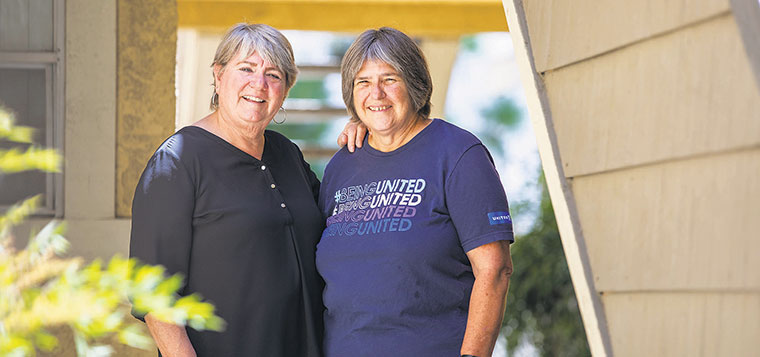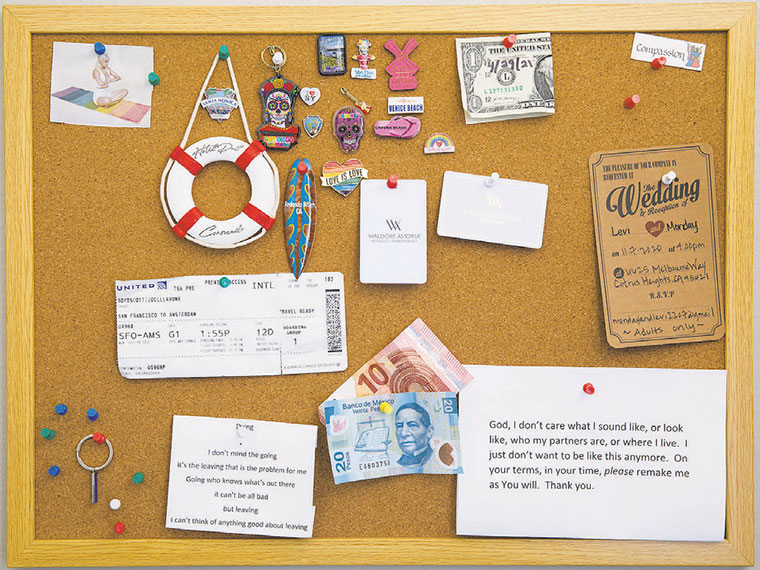By Debra Kamin, New York Times
Maria Boyd-Scott turned 60 last month, and she and her wife, Joey Boyd-Scott,
68, celebrated the milestone in style: They flew business class to Amsterdam, staying at a Hilton for two nights, and then headed to France for two nights at the Waldorf Astoria Versailles.
The damage to their wallets? Thanks to their part-time travel jobs, their flights cost $462 total — they paid only the taxes. The Hilton in Amsterdam was $55 a night, and the five-star hotel in France was $75 a night. The Boyd-Scotts estimate the trip could have cost upward of $6,000.
The couple are part of a growing class of auxiliary travel workers who are stepping in as airlines and hotels, already struggling with thinned ranks after mass layoffs in 2020, now contend with the great resignation of employees. Many of these new workers are seasoned, silver-haired and shameless about the fact that they’re in it for the perks.

NEW YORK TIMES PHOTO
Joey Boyd-Scott, left, and her wife, Maria, both have part-time travel-industry jobs that enable them to travel at a discount.
“I have a lot of friends in the airline industry, and I watched them all fly and thought, ‘Well, that would be fun’,” Maria said. “So I applied when I was 58 years old, and I got a call.”
Maria took a job as a ramp agent for United Airlines in May 2021, loading and unloading baggage at Ontario International Airport in California’s San Bernardino County. Most weeks she puts in 15 hours, the minimum to maintain access to the flight benefits afforded to all United employees, which include unlimited standby travel for herself and a loved one — free within the United States and deeply reduced internationally — and discounted standby fares to any location serviced by the airline.
To round out the deal, Joey earlier this year secured a job as a front-desk agent for a Hilton hotel in Riverside, Calif.; job perks include deeply discounted rooms at the more than 6,800 hotels across Hilton’s global portfolio of 18 brands.
So far, the couple has taken advantage with domestic trips, enjoying a cut-rate staycation at the Waldorf Astoria Beverly Hills and a $55-per-night getaway at San Diego’s famed Hotel Del Coronado. The European vacation was the first time they combined their benefits, but when Joey completes her training — which is currently five days a week — they plan to make it a regular practice.
The travel industry is facing significant labor shortages. In June, domestic employment in the leisure and hospitality sectors was down nearly 8% since February 2020, according to the U.S. Bureau of Labor Statistics, leaving hotels, airlines and other travel operators ill-equipped to contend with surging demand. That crunch — playing out in widespread flight cancellations, terminal halls filled with lost suitcases and diminished room service and daily housekeeping — is prompting companies to recruit at job fairs and sweeten their benefits with bonuses and same-day pay. It’s also pushing them to consider senior citizens for positions that are far from senior.
“We’re open to anything,” said Dan Bienstock, chief people officer for EOS Hospitality, a hotel management company. “We have more job openings across the company than ever before, and we’re thinking outside the box on how to retain talent.”
More than half of the 38 properties in EOS’ portfolio, which includes Red Jacket Resorts on Cape Cod in Massachusetts, and Cape Arundel Inn in Kennebunk, Maine, rely heavily on seasonal guests — and seasonal hiring. The company is not actively targeting older workers for summer jobs, he said, but is focusing recruiting efforts on hotels’ local communities to supplement the summer workforce long filled by international workers on H-2B visas.
“The labor pool for the hotel industry has been hit very hard, and these entry-level jobs have become harder to fill since the pandemic,” said Eric Rubino, chief development officer for Extreme Hospitality, an asset management company working with more than 300 hotels. “For senior citizens, who maybe don’t mind working so hard, they can say, ‘I don’t need the money, but that travel benefit means a lot.’”
Even those who don’t need the money might now see the appeal of a little extra cash, however. Accord ing to the U.S. Bureau of Labor Statistics, the number of hospitality workers older than 65 has outpaced that sector’s population growth since 2012, rising to 590,000 from 418,000. The increase comes as inflation hits record highs, a phenomenon that hits retirees and those on a fixed income the hardest.

NEW YORK TIMES PHOTO
Joey and Maria Boyd-Scott collect mementos from the places they visit. As part-timers in the travel industry, they have time to enjoy their travel perks.
Rubino estimates that since the beginning of the pandemic, at least 65% of new hires at the properties he works with are either post-retirement or older than 50. Representatives for several major airlines, including United, Delta and American, say they either are not tracking these demo-graphics or have not noticed a shift. But hotel hiring managers are.
“I’ve seen an influx of older workers,” said Stephanie Guibert, head of human resources for the Palm Beach Marriott Singer Island Beach Resort & Spa in Florida.
She noted that while her property had seen the number of applicants rise overall, “the biggest struggle is getting people to show up for the interviews or show up for their first day.” Older workers and those nearing retirement age, she said, are showing significantly better follow-through, and hence, being hired more often.
With their new part-time jobs, some older workers have found a chance to break in a passport for the very first time.
Renae Mattimoe, 49, worked for her father’s trucking company in Montana for 20 years, and when he sold the business in 2020, she felt unmoored. Married with seven children, her only international travel had been to Canada in the 1990s, when Americans could still enter with just a driver’s license or birth certificate.
“When you have seven kids, you can’t afford to fly,” she said.
Earlier this year, she took a part-time position with Envoy Air — a regional carrier for American Airlines — at the Bozeman, Mont., airport. She checks people in, takes baggage and occasionally works on the ramp. She also can now fly for free, or just for taxes if the destination is international. In January, she and a co-worker went to Madrid on American Airlines for $46 each. The trip marked the first use of her passport. A visit to London followed.
She makes only $20 an hour and is quick to point out that she could never have taken advantage of the job, or its corresponding perks, if she wasn’t already financially secure.
“You can’t pay your mortgage with flight benefits. You have to be in a position to be able to afford this,” she said. “But it’s surreal. I never imagined this would be my life.”
See More News